

DOWNLOAD PDF
See more in RNAO’s NP utilization toolkit.

On this page: Our journey | #WeAreNPs | Members leading change | RNAO's partnerships and engagements | RNAO policy | Capacity building | RNAO media
Nurse practitioners (NP) play a central role in keeping people healthy and caring for them when ill. We need NPs expanded legislative authorities and expertise to fully address the persistent health inequities and obstacles blocking so many people living in Ontario from publicly-funded health care.
NPs have gained greater scope in practice since 2007, when the title of “nurse practitioner” first became protected in Ontario. University programs and speciality streams have grown to support NP practice across all sectors, including public health, primary care, home care, hospital care and long-term care. And, a new model for NP regulation is currently being developed across Canada.
RNAO’s policy work and advocacy over the past decades has ensured NPs' scope of practice has widened, and NPs are fully integrated across the health system. RNAO will continue to push for more NPs, greater scope and improved compensation. Will you join us?
“NPs are crucial to help improve access to the services people need for better health outcomes.”
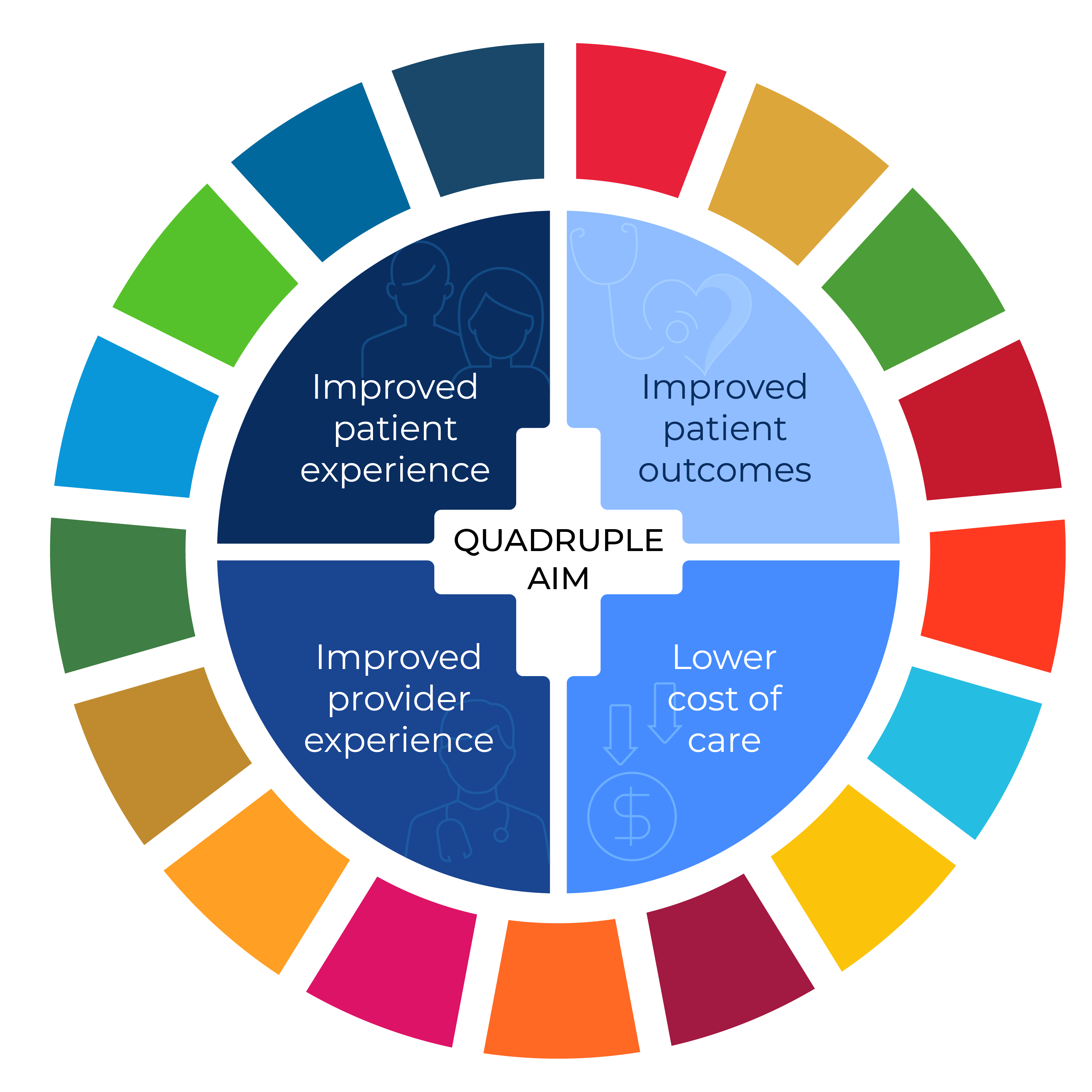
We are NPs and we practise across all sectors in the health system. We are in people’s homes, community health centres and family health teams, outreach programs, NP-led clinics, hospitals and urgent care centres, long-term care and retirement homes, government, and academic and research settings.
We conduct comprehensive physical exams. We independently diagnose and treat illnesses. We order and interpret diagnostic tests, including X-rays, CT and MRI scans, ultrasounds and blood tests. We prescribe treatments and medication including controlled substances. We refer patients to specialists and are referred to by other health providers. We care for people with complex medical conditions. We provide high-quality care for individuals across their life spans.
We advocate for a more equitable and inclusive health-care system. We recognize the social determinants of health, such as income and housing, affect people’s health and wellbeing. We provide care to marginalized and vulnerable populations. We are autonomous practitioners who are experts in our field and are inspiring the next generation of NPs.
We are leaders, policy makers, mentors, educators and learners. We are compassionate, knowledgeable and always person-and family-centred.
#WeAreNPs. We can make a difference for all Ontarians. We can transform the health system.
Join the #WeAreNPs social media campaign to increase the public’s understanding of the vital role NPs play in Ontario’s health system. Download the image, add your fact or story about NPs (using a photo-editing tool, such as Paint, Photoshop or Canva) and share it on your social media platform of choice using “#WeAreNPs” using “#WeAreNPs” and tag @RNAO on X (formerly Twitter) or @registerednurses on Instagram. Or, create your own sign (or print this one in teal or this one in orange), snap a photo and/or video and share it. Remember to wear your NP pin in the photo as well.
If you take a video, please share a few words on what being an NP means to you. We encourage all NPs to wear their NP pin – always – in the videos, at work and also when speaking with elected officials and reporters.
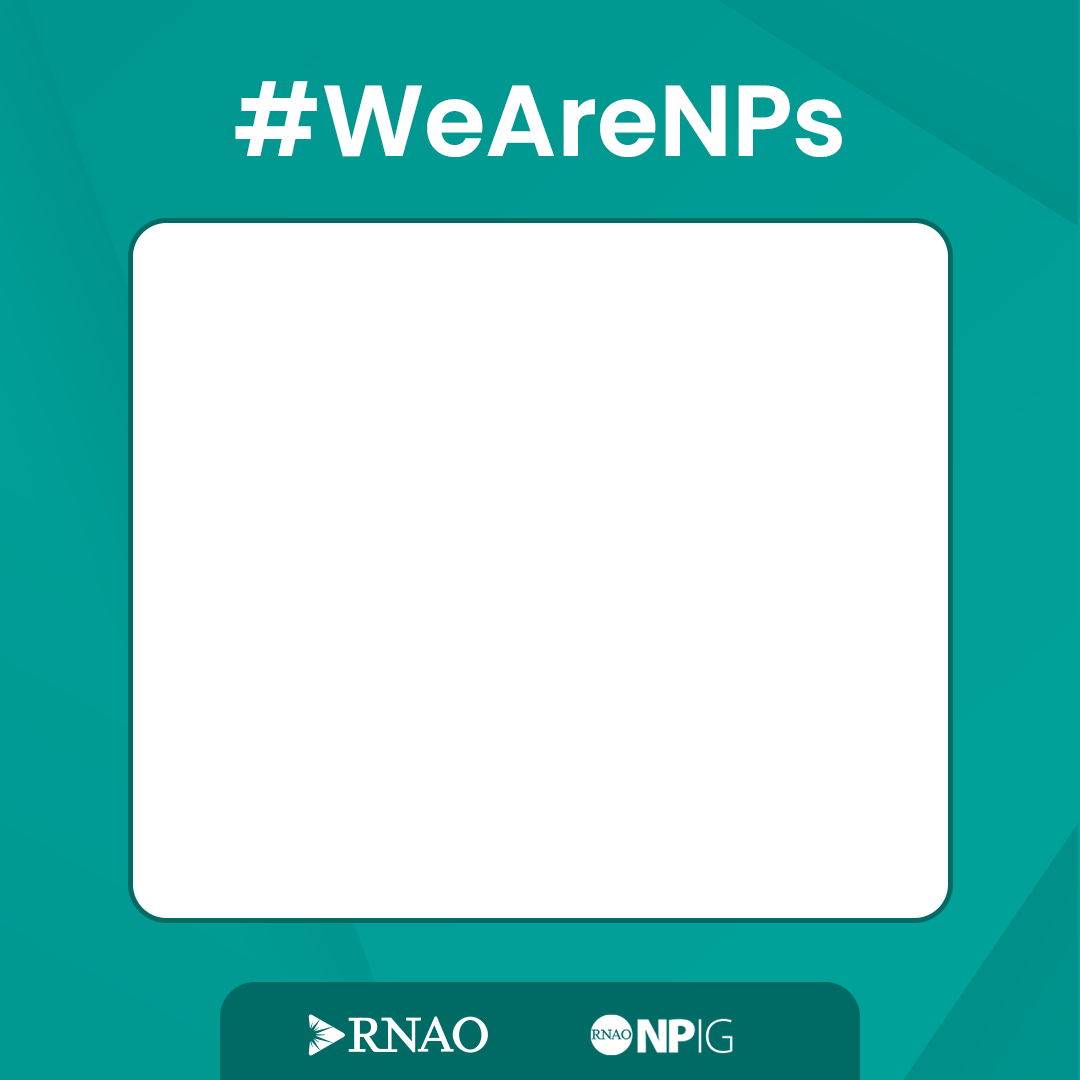
NOTE: To write your message, please download and open in your preferred design program: Canva, Paint, Photoshop, Illustrator.
RNAO continues to work towards ensuring fulfilment of the following recommendations outlined in the Vision for Tomorrow report:
1. Increase the supply of NPs across all sectors and settings.
2. Optimize the utilization of NPs within current scope of practice.
3. Expand the scope of practice for NPs.
4. Align NP curriculum with expanding scope of practice.
5. Harmonize NP compensation across all sectors and settings.
6. Invest in research to support NP practice and improved health outcomes.
7. Optimize access and continuity of care by ensuring all insurance benefit carriers, and other such payers, accept NP services analogous to physician counterparts.
8. Showcase impact of NPs through public education campaigns to advance full utilization of NPs across all sectors and settings.
NP Interest Group (NPIG)
Mission statement: NPIG strives to strengthen the role of NPs in Ontario by supporting and representing action on behalf of NPs in collaboration with RNAO’s staff and board of directors.
Member-exclusive benefits include:
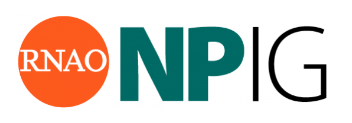
Sign up for RNAO to join NPIG
NP Town Hall with RNAO's Executive Leadership
On May 6, 2024, RNAO President Dr. Claudette Holloway, CEO Dr. Doris Grinspun and President-Elect NP Lhamo Dolkar hosted a town hall with NPs from across Ontario to celebrate the accomplishments of RNAO together with NPIG, and discuss future direction of advocacy within the NP portfolio. Dr. Eric Staples, then chair of NPIG, moderated the event.
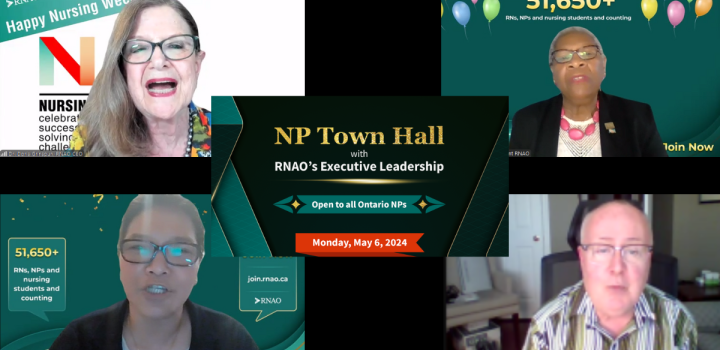
On Sept. 17, 2024, RNAO hosted its second NP Town Hall to discuss proposed funding models for independent primary care NP practice without user-fees and advocacy to achieve funding.
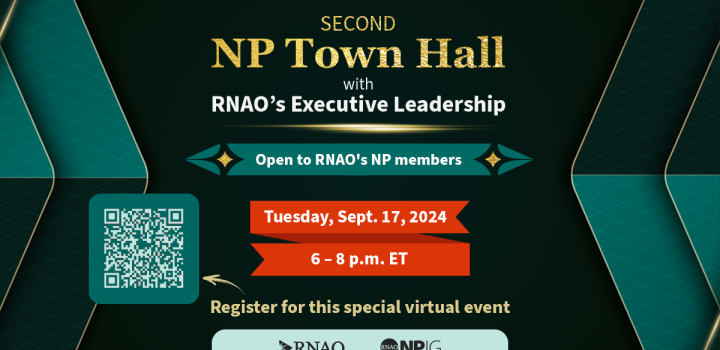
Wear your NP pin, be #RNAOProud
Wearing your pin – whether on your clothing, lanyard or scrubs – is a symbol of your pride as a nurse and commitment to speaking out for nursing and health-related issues as a member of RNAO.
Participate in the #RNAOProud social media campaign to showcase nurses’ strong collective identity.
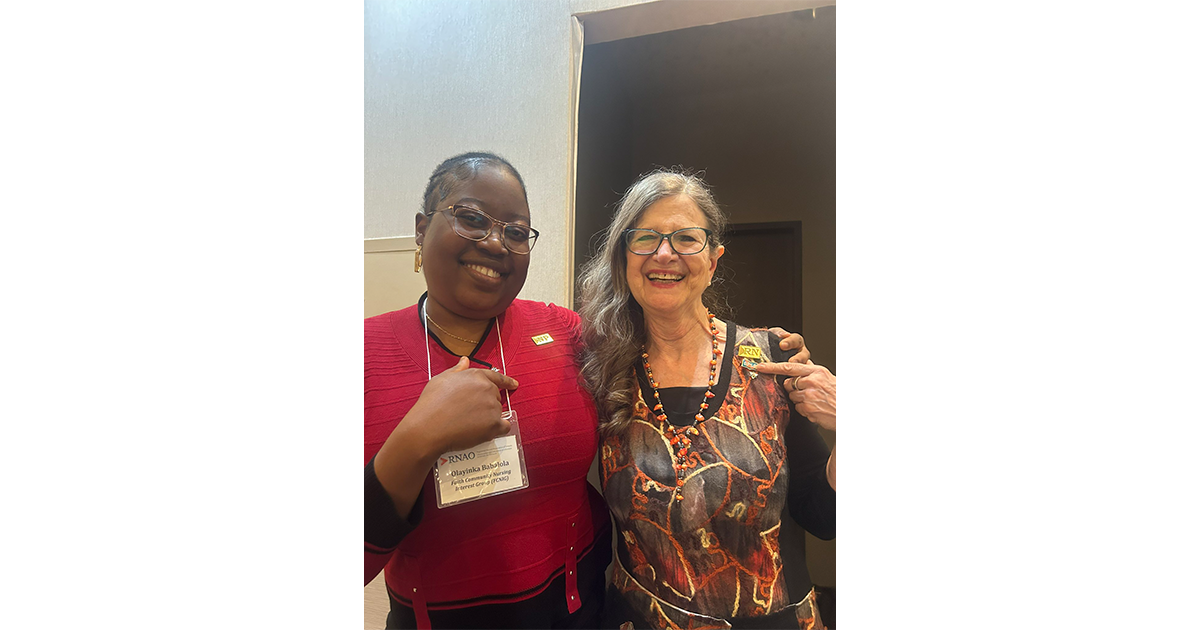
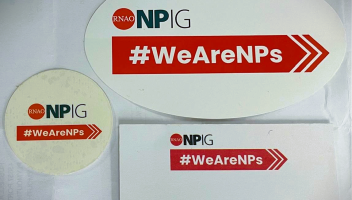
Nurse Practitioner Mentorship Program
RNAO works with NPIG to develop and manage a Nurse Practitioner Mentorship Program. The mentorship program enables novice NPs to transition into the work setting.
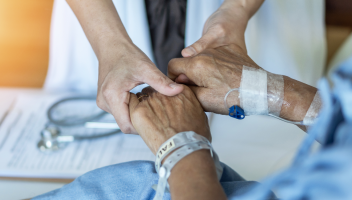
Palliative Care Facilitated Access (PCFA) program
The PCFA program allows eligible NPs to independently prescribe high-strength, long-acting opioids for those receiving palliative care services. RNAO is happy to process an application to the PCFA program for RNAO members and non-members. This initiative is in partnership with the Ministry of Health and Ministry of Long-Term Care.
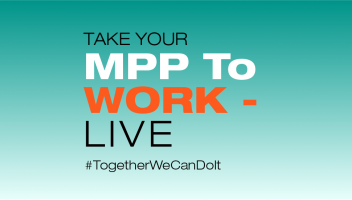
Take Your MPP To Work (TYMTW)
TYMTW started as a celebration of Nursing Week and has been an annual event since 2000. TYMTW was conceived as an opportunity for RNs, NPs, and nursing students to give on-the-job tours of their diverse workplaces to politicians.

Recognition Awards
The RNAO Recognition Awards are presented annually to recognize individuals and groups that make significant contributions to RNAO's mandate of speaking out for nursing and speaking out for health. To honour these individuals and groups, consider nominating a colleague, yourself or your organization for one of RNAO's prestigious Recognition Awards.
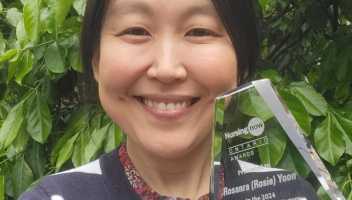
Nursing Now Ontario Awards (NNOA)
Congratulations to the 2024 NP recipient Rosanra (Rosie) Yoon (read bio).
"The awards honour nurses work in improving Ontarians' health and quality of life during the best and worst of times," says RNAO CEO Dr. Doris Grinspun. NNOA celebrates the contribution of nurses who improve the health outcomes of Ontarians and who contribute to nursing practice. Awards are presented to one winner in three categories: NP, RN and RPN.
Members mobilizing change
RNAO encourages its members, chapters, regions without chapters and interest groups to submit resolutions for review and discussion at RNAO’s Annual General Meeting to help raise the profile of important nursing and health issues, and guide the work of their professional association. Learn more about the resolutions process.
Call for flexible government funding models for NPs in Ontario to bolster their integration into the province’s primary care settings, improve patients' access to care services, and reduce emergency departments wait time
Advocate for funding models to enable independent practice without user fees.
Expand the Canadian Association of Schools of Nursing (CASN) Nurse Residency Program to include new nurse practitioner (NP) graduates
Advocate for CASN to expand the Nurse Residency Program to include NP graduates.
Submitted on behalf of NPIG
Expand Ministry of Health and Long-Term Care funding to support the inclusion of Attending NPs in retirement homes and assisted living facilities nurse
Advocate for ministry funding to support the inclusion of attending NPs in retirement homes and assisted living facilities.
Submitted on behalf of NPIG
Expand NP Regulatory Authority under the Vital Statistics Act for Medical Certificate of Death (MCOD) Completion in All Circumstances
Advocating for NP scope of practice expansion to include regulatory authority under the Vital Statistics Act to support MCOD completion.
Submitted on behalf of NPIG
Support the inclusion of NP authorization on the Ontario Ministry of Health’s Application for Funding Hearing Devices form
Advocate for ministry support for the inclusion of NPs to complete authorization on the Application for Funding Hearing Devices form.
Submitted on behalf of NPIG
Greater representation of Black NP in health-care settings
Support the mentoring, recruitment and retention of Black NPs to address the persistent inequities and obstacles in accessing culturally safe, inclusive and sensitive health care in Ontario.
Progress update: Included in RNAO’s 2024 provincial pre-budget submission. Stay tuned for more in RNAO’s 2023 – 2024 annual report.
Expand NP scope of practice to include authority to complete forms under the Mental Health Act
Advocating for NP scope of practice expansion to include the ability to initiate and complete all forms under the Mental Health Act.
Submitted on behalf of NPIG
Rapid response treatment team
Fund a rapid response treatment team consisting of NPs, RNs and physicians for seniors who live in their own homes and are 85 years of age and older.
Advocating for Professional Development for NPs
Support NPs in negotiating employment with any employer to exercise their professional right, as part of self-regulation, to include professional development and support for non-clinical activities, as part of their term of employment so if audited by the College of Nurses of Ontario, can demonstrate these competencies as part of personal and professional growth.
Submitted on behalf of NPIG
Progress update: Read page 63 of RNAO’s 2021-2022 annual report.
Address vaccine hesitancy
Develop and implement a plan to empower RNs, NPs and nursing students to promote the importance of vaccines and address vaccine hesitancy across the lifespan as well as among health professionals to increase vaccine knowledge and uptake within communities.
Progress update: Read page 44 of RNAO’s 2020-2021 annual report. On Feb. 8, 2021, RNAO hosted a webinar related to this topic.
Funded NP Interprofessional Collaboration with Midwives
Advocate to municipal, provincial and federal governments for funding for nurse practitioner collaboration with midwives in the delivery of primary care for women +/- children.
Psychotherapy Insurance
Advocate for accessibility to psychotherapy through billing insurances to be inclusive of RNs and NPs who will be authorized to perform the controlled act of psychotherapy once proclaimed.
Progress update: Read pages two and six of RNAO’s 2019 Resolutions Report, respectively.
Psychotherapy And OHIP Coverage
Advocate to the provincial government to extend OHIP coverage to be inclusive of RNs and NPs who will be authorized to perform the controlled act of psychotherapy.
Progress update: Read page 32 of RNAO’s 2018-2019 annual report.
Last updated on May 2, 2024.
This you your quote body.
Hello there
"…we expect to see a corresponding increase to the number of NP seats given the shortage of family doctors and the critical role of NPs in addressing access challenges,” – RNAO President Dr. Claudette Holloway, 2024 spring budget response (March 26, 2024)
“Any good health-care system starts with primary care,’ Grinspun told Simcoe.com, explaining that such (NP-led)-clinics reduce the amount of people using hospital emergency rooms for regular health care.” (Feb. 22, 2023)
Action Alert: Fund nurse practitioners in primary care, premier!
“Those with money are not supposed to get better access to care… ‘It’s about universal access to care.’” – Dr. Doris Grinspun, RNAO CEO, Hamilton Spectator (Feb. 6, 2024)
“We can make the (LTC) sector more responsive to residents by fulfilling a commitment to have one NP for every 120 residents in every LTC home,” – Dr. Doris Grinspun, RNAO CEO (January 2023 media release)
“…implement necessary regulatory and legislative changes to authorize NPs as medical directors, recognizing the major and very effective role of NPs as medical directors in numerous settings during the COVID-19 pandemic.” – RNAO submission on Fixing LTC Act regulations (March 2024)